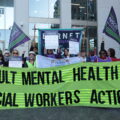
Think Ahead has raised concerns about cuts to mental health social work job numbers as it launched a campaign for the government to invest in thousands more roles.
The fast-track social work training provider said it had seen “trends of mental health social work roles disappearing in some NHS teams”, while some employers were pulling out of its programme on budgetary grounds because they could not commit to providing salaried jobs for trainees on qualification.
Under Think Ahead’s two-year programme to train people as adult mental health social workers, participants spend a qualifying year placed with an NHS or local authority employer, who then takes them on as a salaried employee in year two.
Cutbacks in mental health social work roles
The charity said that, of employers who partnered with it in 2024, 35% were unable to do this year for financial reasons, up from 20% of partners who pulled out last year for similar reasons. It said this was affecting NHS trusts more than councils.
“What we are experiencing in terms of the development of our programme is that where budgets are squeezed, non-clinical roles, like mental health social workers, seem to be first to take the hit – perhaps because they are seen as non-essential to mental health,” said Think Ahead chief executive Philippa Mariani.
Cutbacks to mental health social work numbers would mark a turnaround from the 20% growth in NHS mental health trusts seen from 2019-22, which left 3,576 whole-time equivalent (WTE) practitioners in post.
Despite the growth, this accounts for just 2% of England’s NHS mental health workforce, which numbered about 143,700 in 2023, according to think-tank the Nuffield Trust, with about twelve times as many mental health nurses (about 45,000) as social workers.
Also, the profession was not mentioned at all in the 2023 NHS workforce plan, prompting criticisms from Think Ahead and the British Association of Social Workers.
Call for 24,000 more practitioners
The plan is due to be refreshed this year and Think Ahead said it wanted to see a sevenfold rise in the number of NHS mental health social workers, to almost 28,000, over the next 10 years.
This is based on everyone with severe mental illness in England – of whom there were about 624,000 in 2024, according to an NHS estimate – having a social worker, and practitioners having a caseload of 20-25. The latter is based on a proposed limit for adults’ social workers set out in a 2022 report for Social Work Scotland.
Think Ahead said recruiting many more social workers would help tackle the social issues that were associated with mental ill-health, including those related to housing, poverty, employment, relationships and social connections.
Mariani said that, besides working in community mental health teams, social workers could be used more in inpatient settings, to support people’s recovery and discharge.
Think Ahead’s ambition would involve the recruitment of a net additional 2,400 social workers annually over the next decade, which the charity said would cost £130m in year one, including salary, oncosts and recruitment.
Social workers ‘a vital lifeline’ for tackling inequalities
Its Social Work Matters campaign was backed by charity the Centre for Mental Health, whose chief executive, Andy Bell, said social workers were “a vital lifeline” for tackling the inequalities faced by people with severe mental illness, including in relation to income, employment and life expectancy.
The NHS Confederation, which represents healthcare bodies, was also supportive, with its mental health director, Rebecca Gray, saying: “We welcome Think Ahead’s call to invest significantly more in mental health social workers in the NHS.
“They play a crucial role as part of multidisciplinary mental health teams – for example, in supporting patients who are leaving hospital, to finding suitable accommodation and working with parents who have mental health issues. This is so important as parental mental health is a significant risk factor for child mental health.”
Call for Casey Commission to address mental health social work
She said the Confederation hoped that Baroness Casey’s government-appointed commission on adult social care, due to start work shortly, “will present an opportunity to properly address the role and contribution of mental health social workers”.
In response to Think Ahead’s campaign, a Department of Health and Social Care spokesperson said: “Mental health social workers provide an invaluable service, and the workforce is critical to our reforms.
“We will publish a refreshed long-term workforce plan that ensures we have the right people, including mental health staff, in the right places, with the right skills to deliver the care patients need when they need it.”







 Bournemouth, Christchurch and Poole
Bournemouth, Christchurch and Poole  Hampshire County Council
Hampshire County Council  Oxfordshire County Council
Oxfordshire County Council  South Gloucestershire Council
South Gloucestershire Council  Wokingham Borough Council
Wokingham Borough Council  Webinar: building a practice framework with the influence of practitioner voice
Webinar: building a practice framework with the influence of practitioner voice  ‘They don’t have to retell their story’: building long-lasting relationships with children and young people
‘They don’t have to retell their story’: building long-lasting relationships with children and young people  Podcast: returning to social work after becoming a first-time parent
Podcast: returning to social work after becoming a first-time parent  How managers are inspiring social workers to progress in their careers
How managers are inspiring social workers to progress in their careers  Workforce Insights – showcasing a selection of the sector’s top recruiters
Workforce Insights – showcasing a selection of the sector’s top recruiters 

 Facebook
Facebook X
X LinkedIn
LinkedIn Instagram
Instagram
Unfortunately, social workers in mental health teams are increasingly used to do the tasks other professionals don’t want to do , rather than tasks they can do. The AMHP role is typical – the role is merely a stressful exercise of ringing around organising the assessment and then tying up the ends afterwards .. very few want to do the role once they see what it actually is.
I feel with cutbacks on the way social workers will be further excluded from mental health specific teams and AMHPs will just reside in Emergency Duty teams for LA responsibilities.
statutory advocacy within adult mental health services has been trimed, pruned and replanted elsewhere in the garden with on the whole the blessing of the professionals …
…unless there’s a re-recognition for a stand alone statutory social work function in key decision-making-approvals in, say, detention or mental capacity then the job is redundant, no? …
… the ethics of such are showing up across sucessive Government with the return to poorly veiled Poor Law decision-making criteria of deserving and undeserving recipients of welfare …
… the mdt approach has always served the I’ll thought out purpose of salami slicing and making cuts easier to stomach, if not fashionable, while mitigation of any blame for services failure is spread or hidden by the collective decision making machinery of an mdt…
… it’s so 1990’s, right? …
Social workers with good mental health training should be increased to cope with the Nations current issues. My son now 58years old has has Schizophrenia for over 25 years. He only was assigned a Social worker two years ago, after a 3rd time my son had beeb sectioned. The person assigned had very little knowledge of his condition and for those 2 years caused mire problems than he solved. If I had not been here to support my son, as I have done continuous ly I fear for my sons life. That is no exaggeration.
Mental health at any age or whatever reason needs knowledgeable people dealing with their special problems.
Another reason the powers that be don’t listen. False economy at worst.